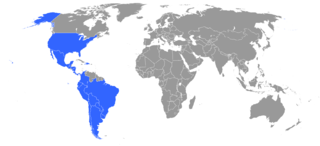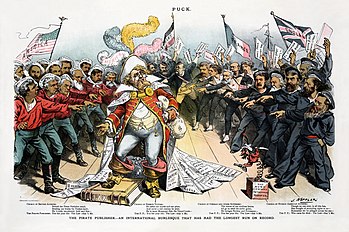
A copyright is a type of intellectual property that gives the creator of an original work, or another right holder, the exclusive and legally secured right to copy, distribute, adapt, display, and perform a creative work, usually for a limited time. The creative work may be in a literary, artistic, educational, or musical form. Copyright is intended to protect the original expression of an idea in the form of a creative work, but not the idea itself. A copyright is subject to limitations based on public interest considerations, such as the fair use doctrine in the United States.

Moral rights are rights of creators of copyrighted works generally recognized in civil law jurisdictions and, to a lesser extent, in some common law jurisdictions.

The Buenos Aires Convention is an international copyright treaty signed in Buenos Aires, Argentina, on 11 August 1910, providing mutual recognition of copyrights where the work carries a notice containing a statement of reservation of rights (Art. 3). This was commonly done with the phrase "All rights reserved" next to the copyright notice. This implementation varied as US law only required the author and year of publishing. Copyright protection under the convention is granted for the shorter of the terms of the protecting country and the source country of the work. The rather vague nature of the requirement for a statement of reservation led to the development of longer and more legalistic wordings, which have persisted despite the developments in international copyright law.
Intellectual property rights (IPRs) have been acknowledged and protected in China since 1980. China has acceded to the major international conventions on protection of rights to intellectual property. Domestically, protection of intellectual property law has also been established by government legislation, administrative regulations, and decrees in the areas of trademark, copyright, and patent.

The International Copyright Act of 1891 is the first U.S. congressional act that extended limited protection to foreign copyright holders from select nations. Formally known as the "International Copyright Act of 1891", but more commonly referred to as the "Chace Act" after Sen. Jonathan Chace of Rhode Island.

The Uruguay Round Agreements Act is an Act of Congress in the United States that implemented in U.S. law the Marrakesh Agreement of 1994. The Marrakesh Agreement was part of the Uruguay Round of negotiations which transformed the General Agreement on Tariffs and Trade (GATT) into the World Trade Organization (WTO). One of its effects is to give United States copyright protection to foreign works that had previously been in the public domain in the United States.

The purpose of copyright registration is to place on record a verifiable account of the date and content of the work in question, so that in the event of a legal claim, or case of infringement or plagiarism, the copyright owner can produce a copy of the work from an official government source.
The copyright symbol, or copyright sign, ©, is the symbol used in copyright notices for works other than sound recordings. The use of the symbol is described by the Universal Copyright Convention. The symbol is widely recognized but, under the Berne Convention, is no longer required in most nations to assert a new copyright.
"Authors' rights" is a term frequently used in connection with laws about intellectual property.
The rule of the shorter term, also called the comparison of terms, is a provision in international copyright treaties. The provision allows that signatory countries can limit the duration of copyright they grant to foreign works under national treatment to no more than the copyright term granted in the country of origin of the work.
The international copyright relations of Russia were virtually non-existent for much of the Imperial era continuing into the history of the Soviet Union until the Cold War. The Russian Empire had only a few bilateral copyright treaties with other nations were concluded; these treaties moreover were weak and of short duration. The treaties from Imperial times had all expired by the time of the Russian Revolution.

The following outline is provided as an overview of and topical guide to intellectual property:
Since 2008 copyright in Afghanistan has been governed by the law on the support the right of authors, composers, artists and researchers.

The Berne Convention for the Protection of Literary and Artistic Works, usually known as the Berne Convention, was an international assembly held in 1886 in the Swiss city of Bern by ten European countries with the goal of agreeing on a set of legal principles for the protection of original work. They drafted and adopted a multi-party contract containing agreements for a uniform, border-crossing system that became known under the same name. Its rules have been updated many times since then. The treaty provides authors, musicians, poets, painters, and other creators with the means to control how their works are used, by whom, and on what terms. In some jurisdictions these type of rights are referred to as copyright; on the European continent they are generally referred to as author' rights or makerright.

The public domain (PD) consists of all the creative work to which no exclusive intellectual property rights apply. Those rights may have expired, been forfeited, expressly waived, or may be inapplicable. Because no one holds the exclusive rights, anyone can legally use or reference those works without permission.

Iran is a member of the WIPO since 2001 and has acceded to several WIPO intellectual property treaties. Iran joined the Convention for the Protection of Industrial Property in 1959. In December 2003 Iran became a party to the Madrid Agreement and the Madrid Protocol for the International Registration of Marks. In 2005 Iran joined the Lisbon Agreement for the Protection of Appellations of Origin and their International Registration, which ensures the protection of geographical names associated with products. As at February 2008 Iran had yet to accede to The Hague Agreement for the Protection of Industrial Designs.

Barbara Ringer was one of the lead architects of the 1976 Copyright Act. She spent much of her career lobbying Congress and drafting legislation that overhauled the 1909 Copyright Act. Ringer was also the first woman to serve as the Register of Copyrights in the United States Copyright Office. During her three decades with the United States Copyright Office, Ringer gained a reputation as an authority on copyright law.
Moral rights in United Kingdom law are parts of copyright law that protect the personal interests of the author of a copyrighted work, as well as the economic interests protected by other elements of copyright. Found in the Copyright, Designs and Patents Act 1988, the moral rights are the right to be identified as the author of a work, known as the right of paternity, the right to object to derogatory treatment of a work, known as the right of integrity, the right not to be identified as the author of someone else's work, and the right to privacy. The right of paternity exists for the entire copyright term, and requires individuals who commercially broadcast, sell, perform or exhibit literary, dramatic, musical or artistic works to identify the author of the work – but this does not apply to things such as typefaces, encyclopaedias or works subject to crown copyright.
Copyright formalities are legal requirements needed to obtain a copyright in a particular jurisdiction. Common copyright formalities include copyright registration, copyright renewal, copyright notice, and copyright deposit.
The copyright law of the United States has a long and complicated history, dating back to colonial times. It was established as federal law with the Copyright Act of 1790. This act was updated many times, including a major revision in 1976.








